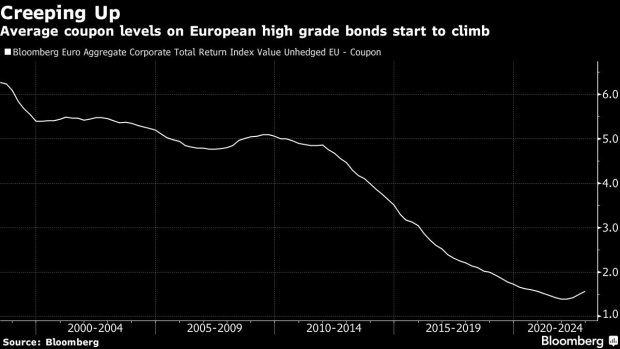Nov 14, 2022
Europe’s Safest Firms Record Biggest Jump in Bond Coupons in Decade
, Bloomberg News

(Bloomberg) -- Blue-chip European companies saw the biggest weekly rise in the interest rates they pay on their bonds in a decade, a sign of the increased pressure on corporate balance sheets.
Coupon payments -- or the average annual interest -- for notes in a Bloomberg index of investment grade securities rose three basis points. That’s the biggest weekly jump since April 2012, coming as the region’s primary market had one of its busiest weeks for sales all year. The average rate is at its highest level since January 2021.
The surge in index coupon payments illustrates how the cost of servicing debt for European firms is creeping up as interest rates rise. Rising bond coupons in tandem with deteriorating economic conditions mean earnings are under pressure, further squeezing margins.
Coupon payments are effectively the interest that companies pay on the debt that they issue into the bond market. The coupon is usually predicated on the yield on a company’s outstanding bonds plus a new issue premium.
With corporate bond yields on the index increasing by 380 basis points this year, coupons are likely to rise sharply as more firms issue new debt to help them run their businesses and refinance.
Alarming Implications
While in most cases the impact of higher interest rates will take a while to filter through to corporate earnings, the longer term implications are more alarming, said Kyle Kloc, a portfolio manager at Swiss fund Fisch Asset Management.
“It’s a headwind to profitability,” he said, and could “lead to higher defaults and more downgrades.”
Barclays analysts led by Soren Willemann estimate that the median interest rate coverage -- the ratio between company earnings and their interest bill, a recognized industry metric for the ability to service debt -- will decline to 2.8 times by 2026 from the current level of 4.4 times.
The lower the ratio, the lower the ability of companies to meet debt requirements.
Moreover, they say that some cyclical, industrial and consumer-related businesses will see their interest rate coverage drop below 2 times by 2026, the point at which investors tend to get worried.
“Though it is difficult to ultimately forecast default rates on a longer-term horizon, we do think the risk is that rolling-five-year cumulative default rates will be at the upper-end of the post-GFC range, at close to 20%,” the analysts said, referring to the Great Financial Crisis of 2008.
Junk-rated coupons haven’t risen as sharply, but this is because there has been very little new bond issuance in that market, said Fahd Malik, a portfolio manager at AllianceBernstein.
Elsewhere in credit markets:
EMEA
There were 11 issuers with 14 tranches in Europe’s publicly syndicated debt market on Monday mid-morning, with minimum issuance volume expected to be at €6.78 billion equivalent
- Italy’s billionaire Benetton family and investment firm Blackstone Inc. are set to move forward with their bid for infrastructure giant Atlantia SpA, even after their takeover offer fell just short of the required 90% shareholder threshold
- At least 604 companies filed for insolvency in the week ended Nov. 11, an increase of 3.6% from a year earlier, according to notices filed to the Gazette
- Rising global borrowing costs are denting the finances of some of the most climate-vulnerable countries right when they most need money to fight the devastating impacts of global warming
- Investors are trying to dump Orpea SA’s debt before the French care-home operator comes out with a restructuring plan next week
Asia
China’s property rescue measures prompted a further rally in dollar bonds of Chinese developers Monday, and fueled gains in broader Asia corporate debt as well.
- Junk dollar notes of developers soared at least 5 cents on the dollar Monday morning, after a Bloomberg index dominated by such notes rose last week for the first time in eight weeks; yield premiums in high-grade Asia dollar bonds narrowed at least 4 basis points, traders said
- The gains reflect optimism that China’s real estate sector, rattled by slumping demand and record defaults, may soon see a bottom; Chinese developers’ shares also surged
- The cost to insure Asian bonds against nonpayment with credit-default swaps dropped, with a CDS index on track to extend its decline to a seventh straight session; that’s the longest streak in 11 months, according to Bloomberg-compiled data
- The Markit iTraxx Asia ex-Japan IG CDS index fell at least 7bps Monday, according to CDS traders
- Primary market deals were subdued at the start of the week, with just Nanjing Yangzi State-owned Investment Group marketing a three-year dollar bond
Americas
Elon Musk, in his first address to Twitter Inc. employees since purchasing the company for $44 billion, said that bankruptcy was a possibility if it doesn’t start generating more cash, according to people familiar with the matter
- While the buyout has removed Twitter from the scrutiny of public markets, Musk loaded the company with almost $13 billion of debt that’s now in the hands of seven Wall Street banks that have been unable to offload it to investors
- The warning came amid a tumultuous start to Musk’s reign at the social media company -- a two-week period in which he has fired half of Twitter’s staff, ushered out most of the top executives and ordered the remaining employees to stop working from home
- North American investment-grade debt issuance will likely fall 6% next year to $1.2 trillion, in part as higher yields crimp supply from non-financial borrowers, according to JPMorgan Chase & Co.
- A group of Arcade Beauty lenders engaged FTI Consulting Inc. and Davis Polk & Wardwell to assess options for the cosmetics packaging company’s upcoming debt maturities, according to people with knowledge of the situation
- For deal updates, click here for the New Issue Monitor
- For more, click here for the Credit Daybook America
©2022 Bloomberg L.P.






